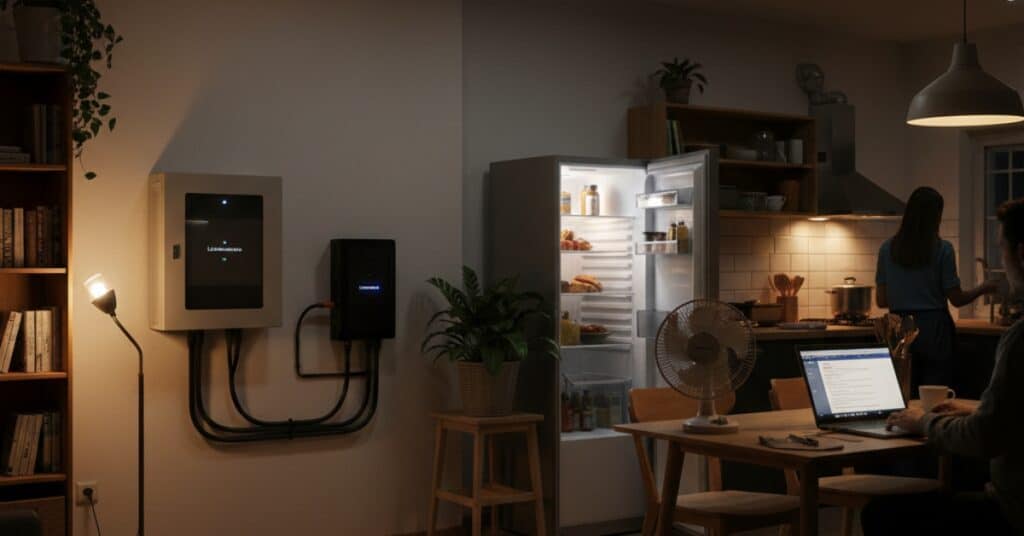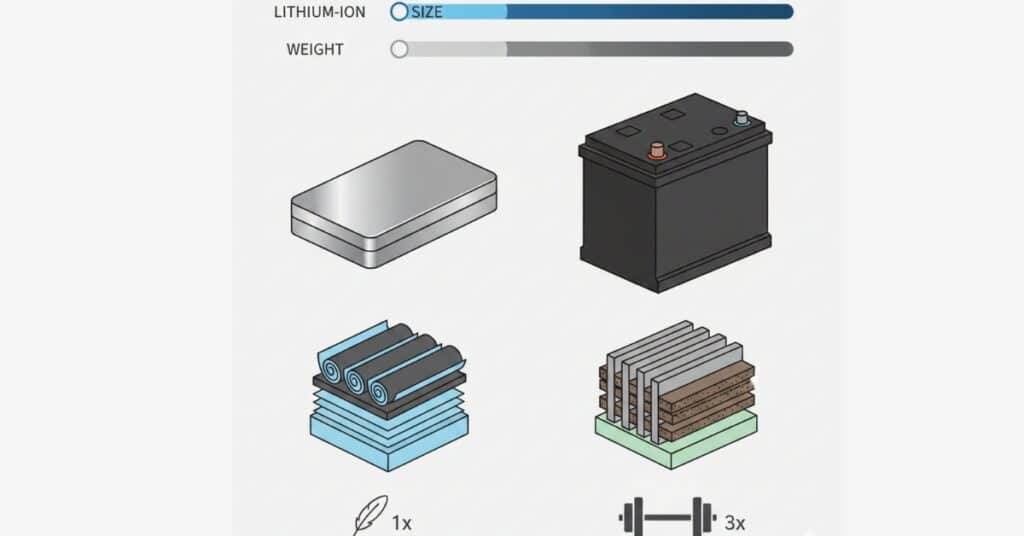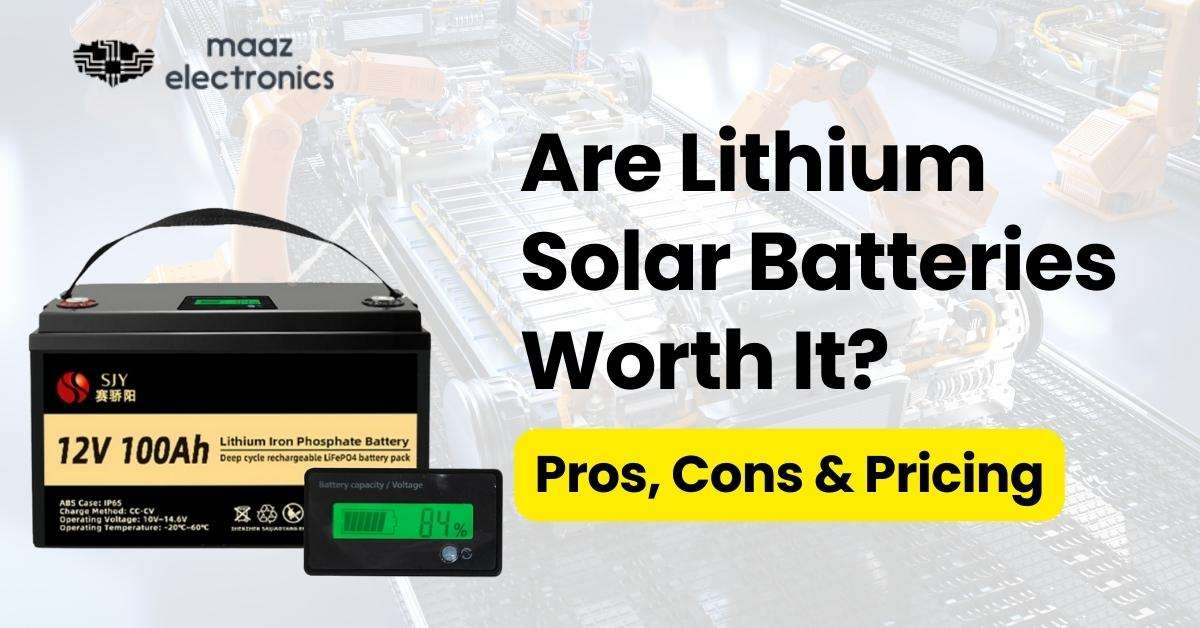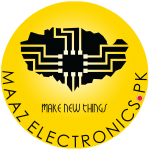No products in the cart.
Are Lithium Solar Batteries Worth It? Pros, Cons & Pricing Leave a comment
Introduction: Why This Question Matters More Than Ever
Over the last few years, I’ve spoken with dozens of homeowners and small business owners who installed solar systems expecting uninterrupted power only to discover that battery choice makes or breaks the entire setup. Solar panels generate energy, but batteries decide how usable, reliable, and cost-effective that energy really is.
This is where lithium solar batteries enter the conversation.
With rising electricity costs, frequent outages, and increasing adoption of solar energy in countries like Pakistan, lithium batteries are often marketed as the “premium” solution. But are they genuinely worth the higher upfront price, or are they just another trend?
This article breaks down how lithium solar batteries work, their real advantages and limitations, pricing in Pakistan, and who should (and shouldn’t) invest in them, using real-world use cases rather than marketing claims.
What Are Lithium Solar Batteries?
Lithium solar batteries are rechargeable energy storage systems that use lithium-ion chemistry (most commonly LiFePO₄ – Lithium Iron Phosphate) to store electricity generated by solar panels.
Unlike traditional lead-acid batteries, lithium batteries are designed for:
- High energy density
- Deep discharge cycles
- Long service life
- Minimal maintenance
They are commonly used in:
- Home solar systems
- UPS and inverter backups
- Electric vehicles and e-bikes
- Telecom and industrial energy storage
According to manufacturers like BYD, Pylontech and CATL, lithium-based storage is now the dominant battery technology for modern solar installations worldwide.
How Lithium Solar Batteries Work (In Simple Terms)

When solar panels produce electricity during daylight hours, that energy flows into the lithium battery. Inside the battery:
- Lithium ions move between electrodes during charging
- Energy is stored chemically
- During discharge, the process reverses and supplies power to your home or equipment
What makes lithium batteries different is their Battery Management System (BMS). This built-in electronic system:
- Prevents overcharging and deep discharge
- Balances individual cells
- Protects against overheating and short circuits
This intelligent control is one of the biggest reasons lithium batteries last significantly longer than lead-acid alternatives. Explore our battery inverter sizing guides
Types of Lithium Batteries Used in Solar Systems
1. Lithium Iron Phosphate (LiFePO₄)
This is the most recommended chemistry for solar energy storage.
Why it’s preferred:
- Excellent thermal stability
- Longer lifespan
- Safer than older lithium-ion chemistries
Common uses:
Home solar systems, UPS, inverters, telecom towers
2. Standard Lithium-Ion (NMC / NCA)
Used more often in electric vehicles and portable electronics.
Pros: Higher energy density
Cons: Shorter lifespan and higher thermal sensitivity compared to LiFePO₄
For solar systems in hot climates like Pakistan, LiFePO₄ is generally the better choice.
Pros of Lithium Solar Batteries (Practical Benefits)
1. Long Lifespan (Real Cost Advantage)
Lithium solar batteries typically last 10–15 years or 3,000–6,000 cycles, depending on usage.
By comparison:
- Lead-acid batteries last 3–5 years
- Require frequent replacements
Real-world insight:
Over a 10-year period, many users replace lead-acid batteries two to three times; often costing more than a single lithium battery.
2. High Energy Efficiency
Lithium batteries operate at 90–95% efficiency, meaning most of the stored energy is actually usable.
Lead-acid batteries waste more energy during charging and discharging, which reduces the effective output of your solar system.
3. Deep Discharge Without Damage
Lithium batteries can safely discharge 80–90% of their capacity.
Lead-acid batteries should ideally not exceed 50% depth of discharge or their lifespan shortens dramatically.
This means:
- More usable power per cycle
- Smaller battery banks can meet the same demand
4. Low Maintenance
Lithium batteries:
- Do not require water refilling
- Do not release corrosive fumes
- Do not need frequent manual checks
This is especially valuable for users who want a set-and-forget energy system.
You might want to check-out our proper electronics maintenance guides.
5. Compact and Lightweight
A lithium battery stores more energy in less space.
Example:
100Ah lithium battery can weigh half of a comparable lead-acid battery, making installation easier and safer.
Cons of Lithium Solar Batteries (What You Must Consider)
1. Higher Initial Cost
Lithium batteries cost more upfront — often 2–3× the price of lead-acid batteries.
However, this is a lifecycle cost issue, not just a purchase price issue. Long-term savings usually offset the initial expense.
2. Temperature Sensitivity
Many modern home systems rely on lithium solar batteries, which require proper ventilation and compatible charge controllers to prevent overheating.
Lithium batteries perform best between 0°C and 45°C.
Excessive heat can reduce lifespan, which is why:
- Ventilation
- Proper placement
- Quality BMS systems
are essential in hot environments. Safety considerations for battery energy storage systems.
3. Requires Compatible Equipment
Lithium batteries require:
- Lithium-compatible charge controllers
- Proper inverter settings
Older systems designed only for lead-acid batteries may need upgrades.
4. Recycling and Disposal
Lithium batteries must be recycled responsibly. Improper disposal can harm the environment.
Reputable suppliers usually guide customers toward proper recycling programs.
Lithium vs Lead-Acid: A Practical Comparison

| Feature | Lithium Solar Battery | Lead-Acid Battery |
|---|---|---|
| Lifespan | 10–15 years | 3–5 years |
| Efficiency | 90–95% | 70–80% |
| Depth of Discharge | 80–90% | ~50% |
| Maintenance | Very low | High |
| Weight | Lightweight | Heavy |
| Long-term Cost | Lower | Higher |
What’s Lithium Battery Pricing in Pakistan (2026 Estimate)
Prices vary by brand, capacity and configuration, but typical ranges include:
- 12V 100Ah LiFePO₄: PKR 55,000 – 95,000
- 3.2V 100Ah LiFePO₄ cell: PKR 15,000 – 30,000
- 24V / 48V lithium systems: PKR 120,000+
Prices continue to fluctuate due to import costs and demand, so buying from a trusted supplier matters.
Real-World Use Cases (Case Studies)
Case Study 1: Home Solar Backup
A homeowner replaced two lead-acid batteries every 3 years. Switching to lithium eliminated replacements and reduced inverter downtime. pros and cons of lithium vs lead-acid solar batteries.
Case Study 2: Small Business UPS
A retail shop using lithium batteries experienced fewer shutdowns and faster recharge after outages improving business continuity.
Case Study 3: Electric Mobility
E-bike users benefit from lighter weight, faster charging, and longer riding range compared to lead-acid alternatives.
Are Lithium Solar Batteries Worth It?
Yes, if you value reliability, long-term savings, and minimal maintenance.
They are especially worth it for:
- Homes heavily dependent on solar power
- Businesses requiring uninterrupted energy
- Users tired of frequent battery replacements
Lithium batteries are not the cheapest option upfront, but they are often the most economical over time.
Explore our guides for hybrid solar inverter systems.
Who Should Consider Lithium Solar Batteries?
- Solar-powered homes
- Offices and shops with UPS systems
- Inverter users seeking long backup times
- Electric vehicle and e-bike owners
Final Thoughts
Lithium solar batteries represent a shift toward smarter, more efficient energy storage. While the initial cost may seem high, their durability, efficiency, and ease of use make them a strong investment for modern solar systems.
If you’re planning to upgrade or build a solar setup, choosing the right battery is just as important as selecting the right panels.


